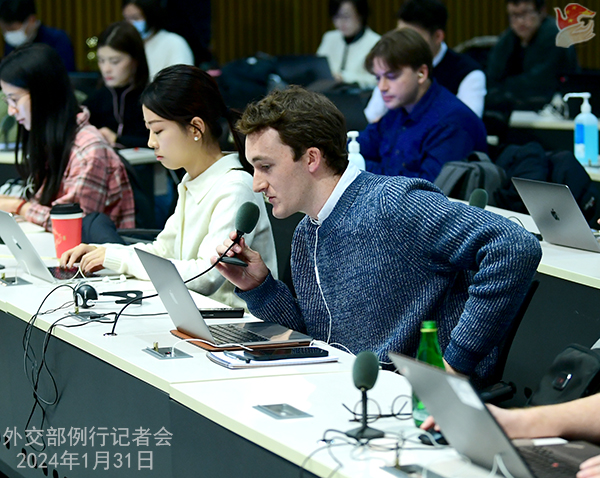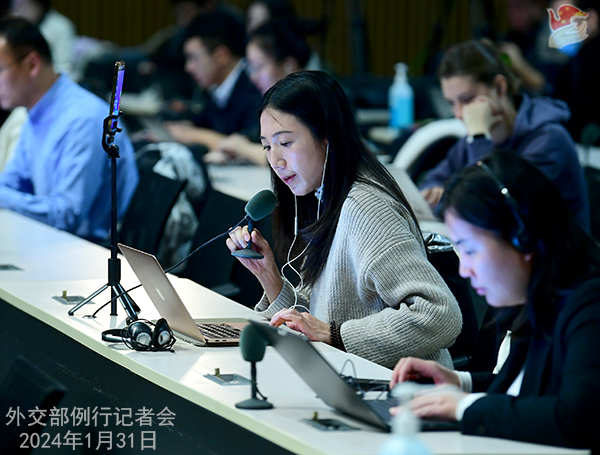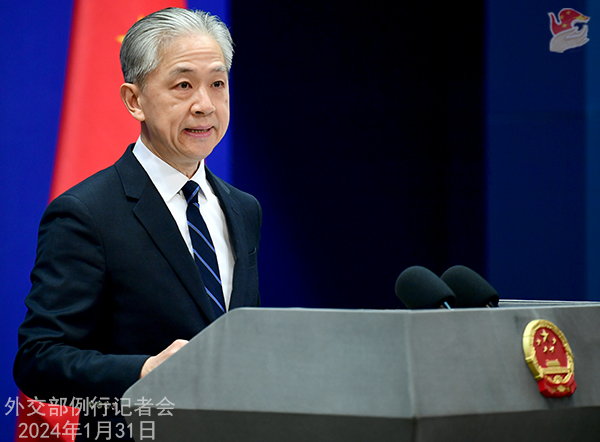
At the invitation of Member of the Political Bureau of the CPC Central Committee and Minister of Foreign Affairs Wang Yi, Minister of Foreign Affairs of Norway Espen Barth Eide will pay an official visit to China from February 5 to 7.
Xinhua News Agency: To follow up on your announcement that Minister of Foreign Affairs of Norway Espen Barth Eide will visit China, how does China view the current relations with Norway? What is China’s expectation for the visit?
Wang Wenbin: China welcomes Foreign Minister Eide’s visit. Norway is one of the first Western countries to recognize New China. This year marks the 70th anniversary of diplomatic ties between China and Norway. Currently our bilateral relations are growing on a sound track, with fruitful cooperation in areas of trade, investment, green development and cultural and people-to-people exchange, and broader consensus on important issues such as free trade, climate change and peaceful development. China stands ready to work with Norway and take this visit as an opportunity to consolidate political mutual trust, deepen practical cooperation, and promote the sustained, sound and steady growth of the bilateral relations.
AFP: It’s reported that the Chinese President yesterday in Beijing received credentials of ambassadors from many countries, including Afghanistan. Does it mean that the Chinese government officially recognizes Afghanistan’s Taliban interim government?
Wang Wenbin: China’s policy on Afghanistan is consistent and clear. As a traditionally friendly neighbor of Afghanistan, China is committed to a foreign policy of friendship toward all Afghan people and has maintained diplomatic ties, exchanges and cooperation in various areas with Afghanistan. It is normal diplomatic arrangement for China to receive the new ambassador to China sent by the Afghan interim government and for him to present his credentials to the Chinese leader. We hope that the international community will step up engagement and exchange with the Afghan interim government, encourage it to actively respond to international concerns, jointly help with Afghanistan’s reconstruction and development, and support Afghanistan’s effort to combat violent terrorist forces and contribute to regional peace, stability and prosperity.
Bloomberg: Can you state clearly if China recognizes the Taliban government or not. In the case where it does not recognize the Taliban government of Afghanistan, what does the Taliban government have to do in order to get official recognition from China?
Wang Wenbin: I said in my previous response that it’s normal diplomatic arrangement for China to receive the new ambassador to China sent by the Afghan interim government and for him to present his credentials to the Chinese leader.
You asked whether China officially recognizes the Afghan interim government, I would like to say that China believes that Afghanistan should not be excluded from the international community. We hope Afghanistan will further respond to the expectations of the international community, build an open and inclusive political structure, adopt moderate and prudent domestic and foreign policies, firmly combat all forms of terrorist forces, develop friendly relations with other countries, especially with its neighbors, and integrate itself into the international community. We believe that the diplomatic recognition of the Afghan government in the world will come naturally as the concerns of various parties are effectively addressed.

CCTV: China has called for an international peace conference on the Palestinian question on multiple occasions for some time, in particular after the outbreak of the latest Palestinian-Israeli conflict. We noticed the recent calls from parties such as the UN, the EU, Palestine, and Israeli think tanks for an international peace conference on the Palestinian-Israeli conflict soon. What’s your comment?
Wang Wenbin: President Xi Jinping has put forth many times China’s position on the settlement of the Palestinian question and on each occasion called for an international peace conference every time. The latest one was last June when he received Palestinian President Abbas who was on a visit to China. During the meeting, President Xi put forward a three-point proposal, stated the importance of keeping to the right direction of peace talks, and called for an international peace conference. After the latest Palestinian-Israeli conflict broke out, China submitted to the UN Security Council the Position Paper of the People’s Republic of China on Resolving the Palestinian-Israeli Conflict and once again called for an international peace conference at an early date. As you mentioned, China’s proposal is increasingly recognized in the international community.
China stands ready to work with all parties to hold a more broad-based, authoritative and effective international peace conference as early as possible, formulate a concrete timetable and roadmap for the implementation of the two-State solution and support Palestine and Israel in resuming peace talks soon for the ultimate peaceful and harmonious coexistence between Palestine and Israel, and between the Arabs and Jews.
Reuters: Have the US-China anti-narcotics groups reached any consensus on the issues discussed? What does this meeting mean for bilateral ties broadly?
Wang Wenbin: On the latest progress in China-US counternarcotics cooperation, China has released relevant readout. You may refer to that or competent authorities for more information.
I would like to say that progress in resuming China-US counternarcotics cooperation has not come easy. We hope that as we launch the working group, the US side will take this opportunity to work with China in the same direction and carry out equal-footed and practical counternarcotics cooperation.
AFP: Chief Executive of the Hong Kong Special Administrative Region Li Jiachao said yesterday that Hong Kong will formulate a new national security law to prevent dangers for “independence.” He said the law covers the offence of overseas interference. Can you share more with us?
Wang Wenbin: You may refer to the announcement of the government of the Hong Kong Special Administrative Region (HKSAR) to enact legislation on Article 23 of the Basic Law. Completing the legislation on Article 23 of the Basic Law is the due obligation of the HKSAR to fulfil its constitutional responsibility to safeguard national security and implement the Basic Law of the HKSAR, the relevant decisions of the National People’s Congress and the Law on Safeguarding National Security in HKSAR. It is also the pressing task of the HKSAR government to address profound internal and external changes, prevent, curb and punish acts and activities endangering national security, and ensure the long-term stability and security of HKSAR and the sound implementation of One Country, Two Systems in the long run. Once completed, Article 23 of the Basic Law will protect the fundamental well-being of all HKSAR residents and the interests of global investors. It will allow the HKSAR to ensure high-quality development and high-level opening up with high-level security guarantee, focus on developing the economy and improving people’s livelihood, give play to HKSAR’s advantages and characteristics, better integrate itself into the big picture of national development and achieve high-quality development. It has full support from us and meets the common aspiration of the HKSAR society.

CCTV: Recently, China has signed agreements on the mutual exemption of visa requirements with Singapore and Thailand. China is implementing unilateral and mutual visa-free policies for more countries. How do these policies work and what steps will be taken to further facilitate cross-border exchanges?
Wang Wenbin: As you mentioned, China implements a visa-free policy for a larger circle of friends, formally ushering in a “visa-free era” with more and more countries. So far, China has signed mutual visa exemption agreements with 157 countries, covering different types of passports, reached agreements or arrangements to simplify visa procedures with 44 countries, and enjoyed comprehensive mutual visa exemption with 23 countries, including Thailand, Singapore, the Maldives and the UAE. In addition, over 60 countries and regions offer visa-free or visa-on-arrival policy to Chinese citizens. All these measures increasingly make Chinese citizens’ outbound travel easier and Chinese passports more valuable, and help foreigners travel, work, study and live in China more conveniently, and are well received by the international community.
Improving visa policies and facilitating cross-border travel is an important measure, through which the diplomatic service contributes to China’s high-quality development and high-level opening-up. This brings more opportunities for deepening friendly exchanges and mutually beneficial cooperation between China and other countries. The executive director of the UN World Tourism Organization said that China’s visa-free policies will help the global tourism industry recover and China’s booming tourism industry will lead neighboring countries to prosper together. After the mutual visa exemption agreement is reached between China and Singapore and between China and Thailand, the number of travel bookings for the Spring Festival made by Chinese visitors to Singapore, Malaysia and Thailand, and that by visitors from these three countries to China surged year-on-year. The “visa-free era” is generating positive effects.
We will continue to upgrade measures facilitating cross-border travel, and provide effective safeguards for Chinese nationals to travel abroad more safely and conveniently. We welcome more foreign friends to visit China, see with their own eyes the country’s vitality, the people’s hospitality and the hustle and bustle of their life, and leave behind more stories of cross-border friendship between the peoples in the new era.
China News Service: It’s reported that Chinese students were again interrogated when entering the US border at the Washington Dulles International Airport. The US law enforcement personnel repeatedly asked questions concerning the students’ political background and academic research, and asked them to provide internal information of the Chinese government in order to get released. After being refused, the US law enforcement personnel decided to cancel their visas, ban them from entering the US and forcibly deport the students. What’s China’s comment?
Wang Wenbin: For some time now, the US has frequently harassed, interrogated and deported Chinese students arriving in the US out of political purposes. Available information shows that at the Washington Dulles International Airport alone, at least eight Chinese students with lawful and valid travel permits were harassed, interrogated and deported by the US side for groundless reasons since the end of November, 2023. The moves by the US law enforcement authorities seriously violate the legitimate and lawful rights and interests of the students concerned, disrupt China-US cultural exchanges and cross-border travel, and go against the common understandings reached by the two Presidents on enhancing and facilitating cultural and people-to-people exchanges. China has made solemn démarches to the US.
The US likes to portray itself as open, inclusive and a place advocating academic freedom and “no border in science,” but it politicizes and weaponizes academic research, and overstretches the concept of national security to wantonly suppress and ill-treat Chinese students. Such moves undermine Chinese citizens’ lawful rights and interests and basic human rights, cause the chilling effect and sour the atmosphere for China-US people-to-people exchanges. In recent cases, the US law enforcement personnel unabashedly induced and infiltrated the victims, which poses direct threat to China’s national security. The moves by the US driven by ideological bias with no respect for truth or rationality are discriminatory and politically motivated law enforcement and will eventually undermine America’s own image.
China urges the US to act on the statement made by President Biden and the common understandings reached by the two Presidents in San Francisco, immediately stop suppressing and restricting Chinese students travelling to the US under the so-called national security reasons, earnestly protect the security and lawful rights and interests of Chinese students and scholars in the US, and remove barriers for China-US exchanges and cross-border travel. China will take resolute measures to safeguard its national security and the legitimate and lawful rights and interests of Chinese citizens.

Reuters: In the Chinese Foreign Ministry’s statement yesterday, it said that the Vice Foreign Minister Deng Li met his Yemen counterpart and both exchanged views on regional and international issues, such as the Palestinian-Israeli conflict as well as the situation in the Red Sea. What was discussed? Could the Ministry share more details on that and any outcomes achieved in this meeting?
Wang Wenbin: China has released a readout on the meeting between Vice Foreign Minister Deng Li and his Yemen counterpart, which you may refer to.
China’s position on the Palestinian-Israeli conflict and the Red Sea situation is consistent and clear. We advocate an immediate ceasefire in Gaza, protection of civilians, alleviation of the humanitarian situation, implementation of the two-State solution, and joint international efforts to keep the shipping lanes in the Red Sea safe.
Reuters: Russia said yesterday that its Foreign Minister Lavrov held a meeting with Chinese Vice Foreign Minister Ma Zhaoxu to discuss the Ukraine conflict, the situation in the Asia-Pacific region and in the Middle East as well as the situation on the Korean Peninsula. Could the Ministry share more details on the discussion and any outcomes from this meeting as well?
Wang Wenbin: On the specifics of the meeting between Foreign Minister Lavrov and Vice Foreign Minister Ma Zhaoxu, we’ve released a readout. You may refer to that.
As we celebrate the 75th anniversary of China-Russia diplomatic ties this year and hold the China-Russia Years of Culture, China stands ready to take this opportunity to work with Russia to enhance strategic collaboration and promote new and greater progress in growing China-Russia relations.
Reuters: Does China have any concerns about changes in the US policy toward China if Donald Trump returns as President?
Wang Wenbin: The presidential election is the domestic affair of the United States. China, committed to the principle of non-interference in others’ internal affairs, will not interfere in America’s presidential election. I want to stress that developing China-US relations is in the fundamental interest of our two peoples and two countries and meets the expectation of the international community. No matter who is elected as US President, we hope the US will work with us in the same direction, follow the principles of mutual respect, peaceful coexistence and win-win cooperation, and advance the steady, sound and sustainable growth of bilateral relations for the benefit of the two countries and the world at large. Meanwhile, we will continue to firmly uphold our sovereignty, security, and development interests.
